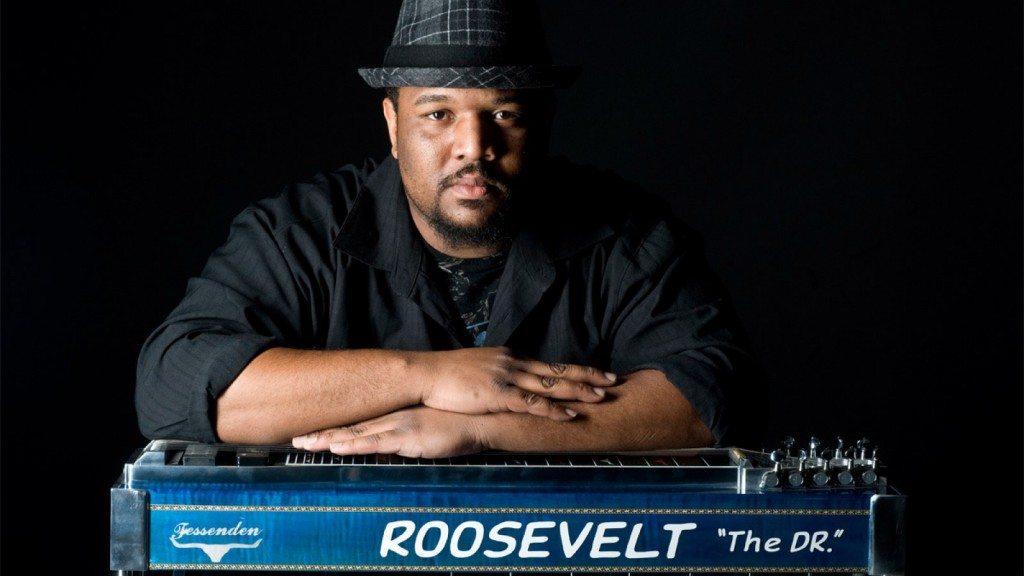 A fourth-generation lap steel guitarist is pushing sacred steel to new bounds, and getting funky in the process.
A fourth-generation lap steel guitarist is pushing sacred steel to new bounds, and getting funky in the process.
Sacred steel is a form of music rooted in gospel, with a steady blend of other influences including R&B, rock, funk, jazz, hip-hop and world music.
“It’s a certain sound that moves you; it’s a blessed instrument,” lap steel guitarist Roosevelt Collier said.
The sound arose in the 1930s, within the Church of the Living God, an assembly of African-American Pentecostal churches around the country. Brothers Troman and Willie Eason introduced the steel guitar to the organization’s worship music, an ideal innovation for the often low-income congregations.
“The short story is that back in the ’30s it was common for poor black people to go get a couple of dollars together for a steel guitar, rather than an organ,” Collier said.
Iconic in the church’s services throughout the 20th century, sacred steel came to wider prominence in the 1990s, perhaps best known through New Jersey’s Robert Randolph and the Family Band.
Collier’s steel roots run as deep as the music itself. His grandfather, Robert E. Lee, was a pastor in the House of God church in Jacksonville, Fla. He played steel guitar, and taught his sons to play. The young Roosevelt grew up around a group of uncles that had devoted themselves to the instrument and formed a family band, the Lee Boys.
“I was coached up under the late Reverend Glenn Lee, who was a master of the craft,” Collier said, referring to his uncle.
Lee started his nephew on drums at age 4, guiding the child through a number of instruments before introducing him to the lap steel at age 12, Collier said. At age 15, he moved on to the full-size, double necked version of the instrument.
“It was overwhelming at first,” Collier said. “A big old double-neck with eight pedals and 20 strings.”
“Glenn said ‘Learn it.’ Sure enough man, I learned it. He taught me the basics, and I just took off with it.”
Glenn was diagnosed with cancer in the late 1990s, and his health began to fail. His nephew began sitting in with the band at age 17 in 2000, the year Glenn died.
“Being raised under them for years and years, with the passing of my uncle, it was more of a passing of the torch for me,” Collier said. “For years I had been playing under him, just learning and coaching and drilling.”
In the years that followed, Collier grew into his own as a steel player, touring around the United States with the Lee Boys and rubbing shoulders with the likes of Bob Weir, the Allman Brothers, the Black Crowes and Los Lobos, among many others.
“With the guidance of my other uncle Alvin Lee, the current bandleader of the Lee Boys,” he said. “Playing up under him, I’ve grown over this past decade, you know, moving up, as my own person and player, my own voice.”
After playing steadily with the family band for more than a decade, Collier recently struck out on his own.
“I embarked on a solo path in 2011 and 2012,” the steel guitarist said, “By 2012 things had started to pick up. I’ve been getting involved in lots of projects.”
In recent years, Collier has toured the country, appearing at music festivals as a guest star and artist-at-large. Organizing “super-jams” with a wide variety of musicians from other bands has been a recent project of his.
“Folks love it,” he said. “They like to see other bands jam together.”
In the last year, Collier has become increasingly involved with California funk band Karl Denson’s Tiny Universe.
“I’ve been friends with Karl D for some time now and we’ve always talked about playing together,” Collier said. “So last year when we talked about it, Karl D gave me the call about coming on tour with him. I thought it was a good thing. I love their stuff and thought it would be a great mix. I’ve played with them a lot, you know, coming on and sitting in, but he asked me to come on tour and play. It’s been a great ride; these guys are great, I’ve learned a lot.”
Denson and Collier are taking funk in a new direction with the addition of the pedal steel, Denson said, noting that he could not recall the instrument being featured in any funk bands that he was aware of.
KDTU’s stage presence is a big part of what Collier enjoys about playing with the group.
“First of all, let’s put it out there that Karl, a.k.a. Diesel, Denson is the man,” Collier said. “Playing with these guys, this whole camp is top notch. These players got a certain type of aura that goes on stage and gets the crowd going, man.”
This aura was on full display on Valentine’s Day, when Karl Denson’s Tiny Universe and Roosevelt Collier played Crystal Bay Casino’s Crown Room, Saturday, Feb. 14.
Collier has been playing on and off with KDTU since fall of 2014, including tour dates in early 2015. He’s also putting in studio time this year, at work on his first album. Another project involves starting a band with Oteil Burbridge, bassist for the Allman Brothers.
Of course, for Collier these are all just small steps toward his big-picture goal.
“I’m just looking forward to touching many folks’ lives through my music,” he said.

